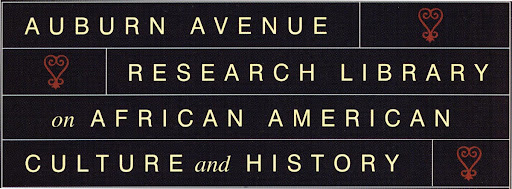"African Origins: Africa's History in a Name," an exhibition of materials from the Emory University libraries, is currently on exhibit at Auburn Avenue. The exhibit is located on the first floor of the building, in the library's reading and reference room.
The exhibit features reproductions of photographs and drawings from the slave trade, as well as route maps and other historical information. A focus of the African Origins project is getting public involvement in collecting information about African names of those slaves transported over the Atlantic. You can both search and contribute information to their database at African Origins. The exhibit will be on display during library hours through October 30, 2011.
Posted by Jessica Epstein, AARL Archives Intern
Wednesday, July 20, 2011
Exhibit on African Name Origins on loan from Emory @ AARL
Labels:
archives,
exhibitions,
public history,
slavery
Friday, July 15, 2011
Life & Times of Robert Small, freed slave and U.S. Congressman
Currently on display in the Cary McPheeters Gallery @ Auburn Avenue: The Life and Times of Robert Small. Small lived from 1839-1915. Born into slavery in South Carolina, Small went on to free himself and his family by comandeering a Confederate ship to Charleston harbor. He later served in the South Carolina state legislature and represented South Carolina as a U.S. Congressman.
Photographs, drawings, ship models and other documents and artifacts representing Small's personal and political life are currently on view in the gallery on the library's first floor. The opening event is next Sunday, July 24, and Donald Sweeper will be performing a reenactment as Robert Small. The exhibit will continue to show through September 18, 2011. You can read more about the exhibit here.
Posted by Jessica Epstein, AARL Archives Intern
Labels:
archives,
exhibitions,
slavery
Thursday, July 7, 2011
Archives and Publics: "Harriet Rising"
The Archives and Publics series highlights connections between archives and various publics – artists, scholars, genealogists, students, documentary filmmakers, authors, and others – and the ways in which different groups access and use archives, with a focus on AARL's constituents.
Today's post features Harriet Rising, a collaboration between artist Lisa Tuttle and writer and activist Alice Lovelace, part of a large temporary public art project titled Elevate: Art Above Underground, presented by the Atlanta Office of Cultural Affairs. Harriet Rising and other installations open August 26th in downtown Atlanta.
Tuttle contacted the Archives Division, hoping to locate images of Harriet Tubman, which will cover various portions of eight four-sided columns, installed in clusters of four on either side of Pryor Street, along the Upper Alabama pedestrian corridor above Underground Atlanta. Since some of the images will be enlarged to cover the 8' x 3' columns, she needed high resolution images, which AARL was able to deliver.
In Tuttle and Lovelace's narrative description of the project, they identify several goals that Harriet Rising will accomplish:
1. Bring renewed attention to Harriet Tubman and her historical importance as an American hero.
2. Draw parallels between the historical significance (Civil War to Civil Rights) of Underground Atlanta and the Underground Railroad.
3. Lifting the visibility of courageous women and organizations working today in the Atlanta community for human rights, particularly those working on behalf of minorities and women, often unrecognized.
4. Add dynamic visual, poetic, educational content to visitors' experiences as they walk along Upper Alabama Street this fall.
Tuttle and Lovelace will bring attention to a number of individuals, among them Glory Kilanko (Director and CEO of Women Watch Afrika, Inc.), Azadeh N. Shahshahani (National Security/Immigrants' Rights Project Director, ACLU of Georgia and the chair of Refugee Women's Network), Loretta Ross (a founder and the National Coordinator of the SisterSong Women of Color Reproductive Health Collective) and Ella Ruth Hunnicutt, Minnie Ruffin, Ann Mauney, and Judy "Artemis" Conder of Grandmothers for Peace. Organizations highlighted include 9 to 5 and WAND.
Tuttle and Lovelace write:
In the United States, there are many women who embody the spirit of Harriet Tubman, working everyday to make life better for women (and therefore entire families) and working for a better world. The lives of these women are not as transparent as Tubman's. They should be.
The Archives Division is pleased to support Lisa Tuttle and Alice Lovelace's work.
Posted by Wesley Chenault, Library Research Associate
Labels:
archives,
Archives and Publics,
memory
Subscribe to:
Posts (Atom)
